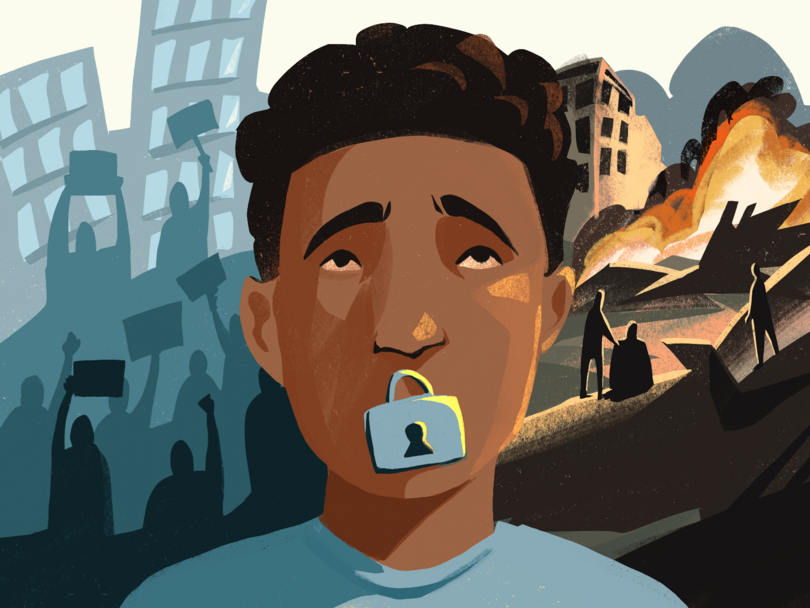Opinion: Passivity on social issues lacks empathy, abuses privilege

Recent arrests and capitalistic movements have shifted the nation into a toxic mentality. Our columnist says a society of this nature discourages individual thinking and mutes empathy, leading us to complacency. Flynn Ledoux | Illustration Editor
Get the latest Syracuse news delivered right to your inbox.
Subscribe to our newsletter here.
As a senior now, it’s clear I’ve matured considerably over the past four years.
With graduation looming, I can’t stop reflecting on my earlier years at Syracuse University. When I was 18 years old and living in Sadler Hall, I lacked a sense of purpose and was satisfied with being a mere witness to life.
Now, at almost 22, life couldn’t feel more different.
I don’t seem to go a day without expressing an opinion on something. I now understand the importance of researching how to work against the outcomes of the newest executive order or analyzing its impacts with my friends.
I’ve learned the gravity of the space I occupy in this world, and as I observe its evolutions, I’ve grown to realize I can’t take my own relative safety for granted. I recognize my duty as a human to speak out and work to protect those who are most vulnerable.
With the realization that not everyone thinks the same way as me, I’ve struggled to grasp what I see as a lack of empathy among the general population. It may be naive of me to assume the best in people, but it certainly stings each time I realize Generation Z doesn’t realize the impact our voices have on the common good, and how easily people are convinced not to speak out at all.
But in our current political and social climate, solidarity among everyday people is a necessity.
With President Donald Trump’s administration’s attacks on transgender rights, efforts to dismantle the Department of Education, limitations on press access to federal coverage and a litany of other offenses, it’s clear no one’s safe — unless, of course, you’re a rich, straight, white man.
To protect ourselves and the people we hold dear, it’s important to make our stances on controversial issues known. Doing so empowers others to follow suit, which ultimately fuels the movement to push back against Trump’s ideology.
It’s vital to provide reasons for those who disagree to further educate themselves and learn how to see the value in opinions that don’t necessarily align with their own.
But I’m aware this is all much easier to say in writing than it is to put into action. For some, speaking out may put them in harm’s way or cost them opportunities necessary to survive. As seen in cases like Mahmoud Khalil’s, engaging in activism under this administration can threaten a person’s immigration status and put them at risk for deportation if they aren’t a U.S. citizen.
This is why it’s crucial for those of us with privilege — who don’t have to risk being deported or losing a job — to speak out while we still can.
Continuing to exist in a passive mindset and function under the misconception that “it’s only politics” completely disregards the real humanitarian consequences these policies and actions have on everyone, not just disadvantaged communities.
We live in a society that actively discourages us from thinking for ourselves, leaving many to forget it’s even an option. Capitalism inherently encourages a self-oriented mindset and tells us it’s our duty to look out solely for ourselves.
By this notion, it makes sense that those with privilege often lack the inclination to speak out, especially if they aren’t yet feeling the effects of current politics. People don’t want to push against the status quo if it’s not harming them directly.
To protect ourselves and the people we hold dear, it’s important to make our stances on controversial issues known.Gray Reed, Columnist
But that’s exactly the mentality we need to break free from. What many fail to understand is that all of our lives are interconnected, and soon, these current policies will impact you, too. Money and social standing can only protect a person for so long.
Above all, empathy shouldn’t be an afterthought. It feels disheartening to need to spell that out, but genuine compassion from others feels hard to come by nowadays. Showing support for people in need shouldn’t be transactional; it must be motivated simply by morality and a social obligation to take meaningful stances.
Part of practicing empathy is teaching and guiding others to resources they might neglect on their own. Sharing information on how certain policies are impacting others, as well as further educating yourself on subjects you may not be well-versed in, facilitates conversation and has the power to bridge gaps.
Even talking to others around you who seem to be unaware of current events is a simple yet powerful way to maintain greater dialogue in the public consciousness.
It’s been easy for some students to say they haven’t felt the impact of most policies over the past years, but under Trump, this reality is ending for all Americans.
This is your wake up call: the time to speak up is now, especially if you’re in a position of privilege. If not for yourself, take a stand for those currently being impacted around you.
Gray Reed is a senior majoring in magazine, news and digital journalism. Their column appears bi-weekly. They can be reached at greed04@syr.edu.






